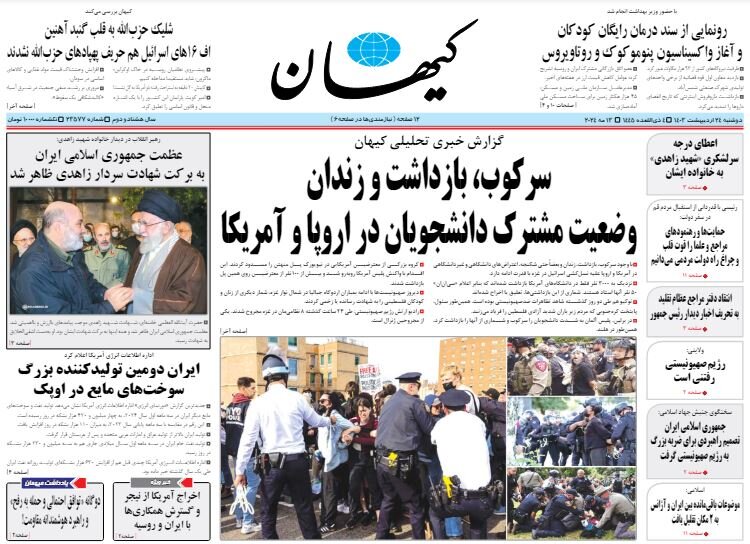TEHRAN PAPERS
TEHRAN - In an analysis, Kayhan dealt with the strategy of Raisi's administration and wrote: The policy of the 13th government was to overcome unfair sanctions and not rely on the negotiation option.
This important issue became the basis for the rule of "disturbing the balance" in the strategic files of Raisi's foreign policy and could be a factor in pushing the West back and getting concessions at the negotiating table. One of the important factors that happened recently was that Israel's interventionist policy in the region did not go unanswered. Iranian missiles hitting the occupied Palestinian territory was only a part of the field operations to show Iran's military power. The 13th government was aware of the fact that it was not possible to realize the maximum interests of the country in foreign policy without using technology in the military industry and using it to repel the direct threats of the enemy. More power belongs to an actor who has more powerful tools, and Iran has so far been able to change the balance of the conflict in the region and raise the indirect costs of the United States' support to Tel Aviv in confronting Iran through this smart strategy.
Iran: A rare prospect of Iranian-Arab interaction
In an article, the Iran newspaper pointed out the two-day meeting of Iranian-Arab dialogue entitled "For cooperation and interaction" and said: This meeting is hosted by Tehran and a large number of thinkers and experts from 15 Arab countries have attended it. Under the current developments in the region, the attendees are looking for perception and understanding of common issues between Iran and the Arab world. Iranian-Arab consultations have found a different meaning under the shadow of recent developments in the confrontation process between Tehran and Tel Aviv. For the first time in recent years, the "True Promise" operation decisively responded to the security threats of the Zionist leaders, and turned Iran into one of the players in diplomatic processes. From the Gaza negotiations to the resumption of intra-regional dialogues Iran is now playing a role as one of the influential countries.
Farhikhtegan: Changing the standard of deterrence
Farhikhtegan investigated Iran's statements regarding the change in its level of deterrence. The paper said: The nuclear issue is a symbol of the change in Iran's level of deterrence, but it is not at its peak. Governments that threaten Iran with attacks with large damages should know that the cost they will bear afterward is higher. The operation of "True Promise" showed the Zionists that Iran inflicts more reciprocal damages against each enemy's action. Accordingly, if the belligerent parties want to attack Iran's nuclear facilities with their criminal nature, they will face an attack on a much wider level. Iran's warning to the belligerent parties should not be summarized only in the physical dimensions of making weapons or nuclear type. This means that if an enemy takes unconventional actions against the people and the "existence" of the country, Iran will reciprocally endanger the existence of that enemy, no matter how big or small it is.
Hamshahri: The Zionist regime's attempt to show a human rights gesture
In a commentary, Hamshahri discussed the painting of Iranian security convict Toomaj Salehi on one of the main streets of Jerusalem and wrote: The painting of a security convict in a street in the occupied territories took place while this regime killed about 14,000 innocent children in the Gaza war. This painting was done at the suggestion of Monarchists who support Israel and with the approval of the city and government authorities of this regime. At the same time, painting this picture shows the attempt of the Zionist regime to assume a human rights position towards security convicts in Iran. But this stance is assumed while today even the most racist Western circles do not dare to publicly defend this regime. These gestures and support are similar to the anti-revolution movements and the Zionist regime, which were directly guided economically and informationally by the security circles of this regime during the riots of 2022.


No comments:
Post a Comment